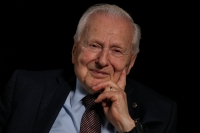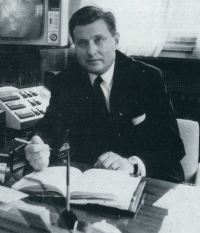We grabbed our lapels and my fate for the rest of the normalization was sealed

Download image
Miroslav Grégr (Grünhut) was born on December 13, 1929 in Prague. He grew up in Kostelec nad Labem, where his father Emil Grünhut worked as a technical deputy director of a sugar factory. Emil Grünhut was an officer in the Czechoslovak army, a Jew who fled with an illegal Jewish transport during the German occupation. He joined the Czechoslovak foreign army in Palestine and took an active part in the fighting at Tobruk and was then transferred to the Eastern Front. Due to his Jewish origin, the witness had to interrupt his high school studies and was forced to work in a German engineering factory. The witness’s paternal grandparents were deported to Terezín in 1940 and perished in Auschwitz in 1942. After World War II, the family changed its name to Grégr. Emil Grégr was arrested in 1950 on the direct orders of Bedřich Reicin, subsequently investigated and imprisoned after a fabricated trial. The witness was expelled from the Faculty of Mechanical Engineering of the Czech Technical University, where he returned after two years to complete the degree in 1954. In 1962 he was appointed director of Děčín Engineering Works (later Desta). After the Warsaw Pact invasion of Czechoslovakia, the Central Committee of the Communist Party of Czechoslovakia included him on the list of “representatives and exponents of the right.” In December 1969, he was expelled from the Communist Party, dismissed as Desta’s director, and fired. After the onset of normalization, he was imprisoned from August to December 1970. For the rest of the normalization, he was employed by the national company Roads and Railways Construction. In May 1990 he co-founded the Industrial Union and subsequently in June he was appointed Minister of Mechanical and Electrical Engineering, initially as a non-partisan and from January 1991 he became a member of the Czech Social Democratic Party (CSSD). On December 21, 1990, he signed a contract with Volkswagen for the privatization of Škoda and was subsequently removed from office on December 31, 1990. After being removed from the post of minister, he returned to northern Bohemia to the position of general director of Děčín Desta, which he led until September 30, 1996. In the 1996 elections he was elected to the Chamber of Deputies and after social democratic victory was named by PM Miloš Zeman as Minister of Industry and Trade. Under his leadership, two units of the Temelín nuclear power plant were completed and put into operation. He is also the holder of the infamous ecological award “Ropák” (“petroleum man”) of the Year, which was awarded to him in 1998 by the Children of the Earth association. In 2010, as a former Minister of Industry and Trade, he was invited to investigate a controversial case involving the privatization of the Most Coal Company. In 2013, President Miloš Zeman awarded him the Medal of Merit. He celebrated his 90th birthday in December 2019 and lived in Klecany at the time of filming (2021).





